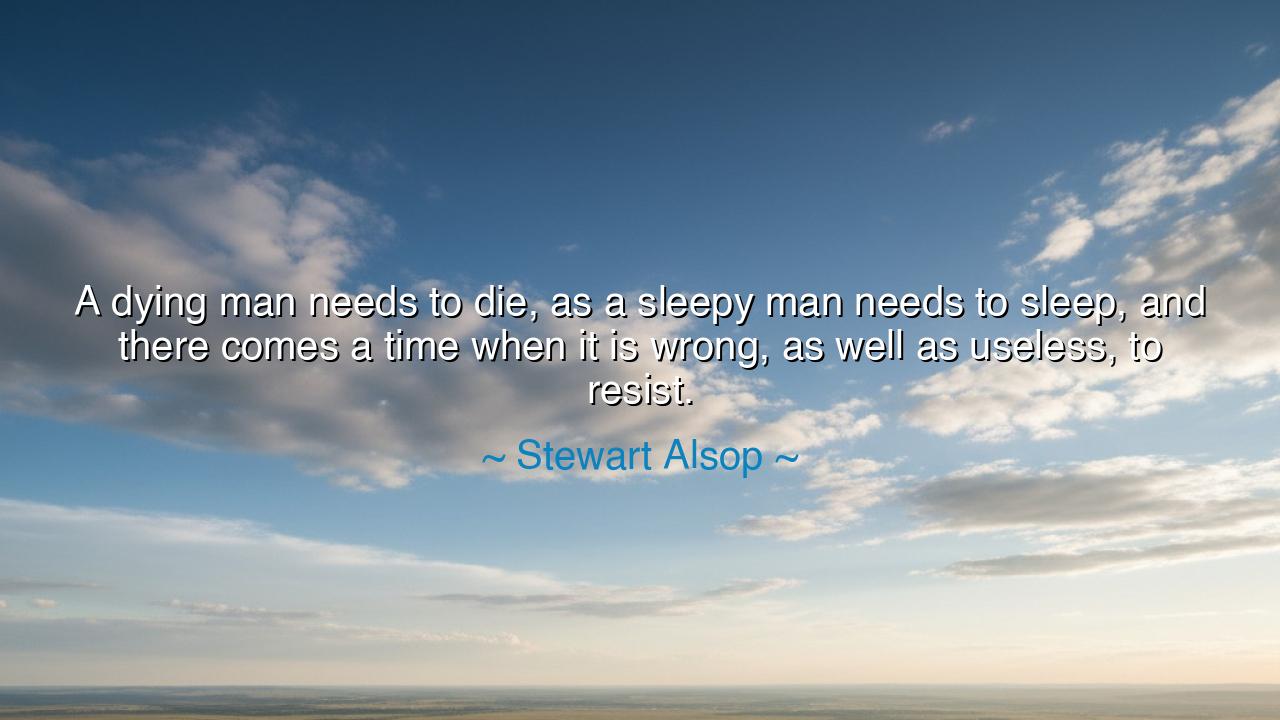
A dying man needs to die, as a sleepy man needs to sleep, and
A dying man needs to die, as a sleepy man needs to sleep, and there comes a time when it is wrong, as well as useless, to resist.






The journalist and thinker Stewart Alsop, a man who faced death with both courage and contemplation, once wrote: “A dying man needs to die, as a sleepy man needs to sleep, and there comes a time when it is wrong, as well as useless, to resist.” In these simple, tender words, Alsop speaks to the profound and inescapable truth of the human journey—that death, like sleep, is not the enemy, but the natural completion of life. His words are not a cry of despair, but a whisper of wisdom: that acceptance, not resistance, is the final act of grace. Just as night must follow day, so too must death follow life, and to fight endlessly against this rhythm is to fight against the very harmony of creation itself.
To die as a man must die is not defeat—it is fulfillment. Alsop likens death to sleep, not to diminish its gravity, but to reveal its gentleness. For the soul, weary from the labors of life, there comes a moment when rest is not only deserved but sacred. Just as the tired traveler lays down his head without fear of the dark, the dying man, when his time has come, must also surrender—not in weakness, but in trust. Life’s battles are noble when they serve purpose; but when the struggle becomes a refusal of what is natural and ordained, it turns to folly. Thus, Alsop teaches that there comes a time when resisting death is not only futile—it is wrong, for it denies the peace that awaits beyond the threshold.
The origin of this quote lies in Alsop’s own confrontation with mortality. A celebrated American journalist and political commentator, he wrote these words near the end of his life, as he faced terminal leukemia. His reflections, gathered in his final work Stay of Execution, were not those of a man who had given up, but of one who had awakened to the truth that life’s value is not measured by its length, but by its completeness. Having lived with vigor, passion, and purpose, Alsop came to see death not as an intruder but as a companion long expected. His statement reflects a deep spiritual maturity: an understanding that to embrace death at the right time is to honor the rhythm of existence itself.
Through the ages, the wise have echoed this same teaching. The Stoic philosophers of old, such as Seneca and Marcus Aurelius, spoke often of death not as something to be feared, but to be understood and accepted. Seneca wrote that “He who fears death will never do anything worthy of a living man.” To fear death excessively, to fight it long after the spirit has grown weary, is to cling not to life, but to illusion. The ancients believed that the acceptance of mortality was the crown of wisdom—that only in embracing death could one live freely. Stewart Alsop, centuries later, gave this timeless truth new voice in modern words, reminding a restless age that peace comes not through denial, but through surrender to the inevitable.
Consider also the example of Socrates, condemned to drink the cup of hemlock. His friends wept, but he spoke gently to them, saying that death was merely the soul’s release from the body—a journey, not an end. He drank calmly, without struggle, and faced his final moment as one who lies down after a long day’s labor. Socrates, like Alsop, understood that death, when accepted with grace, becomes an act of harmony with nature and with truth. The struggle against it, on the other hand, becomes a rebellion against both peace and wisdom.
Yet Alsop’s words hold meaning not only for those facing death, but for all who struggle against the inevitable changes of life. For there are many “dyings” in a lifetime—the end of youth, the loss of love, the fading of dreams. In each of these, we are called to release what has reached its natural conclusion. To resist what must pass is to prolong suffering; to let go is to invite renewal. Just as the earth must yield its leaves to winter so that spring may come again, so must we, too, learn to bow to the cycles that shape us. In this way, death becomes not a single event, but a teacher that guides us through all seasons of existence.
So, my child, take this lesson deeply to heart: Do not fear the ending that must come, whether it be of life or of any chapter within it. There is a holiness in acceptance, and a peace that only surrender can bring. To live well is to fight bravely for what matters—but to die well, or to let go when the hour demands it, is to trust that life’s design is larger than your understanding. When the time comes, whether for rest, forgiveness, or death itself, do not resist as one chained to the past. Instead, breathe deeply, and yield to the mystery that holds all things in balance.
For as Stewart Alsop teaches, there is a moment when resistance becomes not courage but folly, and surrender becomes not weakness but wisdom. Like the tired man who welcomes sleep, so too must we one day welcome death—not with despair, but with serenity. To die, in its truest sense, is not to end, but to return. And in that returning, the weary spirit finds at last the rest it has longed for since the first dawn of its living.






AAdministratorAdministrator
Welcome, honored guests. Please leave a comment, we will respond soon